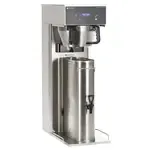
Everything You Need to Know About Restaurant Financing & Loans
Starting a restaurant business is an exciting but challenging endeavor. It requires a passion for food and hospitality, careful planning, and financial resources to make the project a reality.
Securing the necessary funds for a restaurant business can be the biggest challenge for aspiring restaurant owners. Fortunately, various financing options are available to help entrepreneurs turn their restaurant dreams into profitable ventures.
Financing options include bank loans, attracting investors, utilizing personal savings or retirement funds, business credit cards, seeking grants, or exploring partnerships. Therefore, we’ll cover the most popular restaurant financing options to make things easier for interested entrepreneurs.
What is Restaurant Financing?
Restaurant financing specifically caters to businesses in the restaurant industry and can fund the purchase of new equipment, remodeling, or business expansion. This type of financing aims to help restaurants grow and succeed by providing them with access to capital through various options, such as loans, leases, and lines of credit, each with benefits and drawbacks depending on the business’s particular needs.

Ways to Get Funding for a Restaurant Business
Starting a restaurant business is costly, requiring significant capital to finance the purchase of equipment, real estate, insurance, and other necessary expenses.
However, there are different ways to secure funding for a restaurant business. For instance, entrepreneurs can access traditional loans from banks, apply for grants from government entities, seek investors or venture capitalists specializing in food-related businesses, or use crowdfunding platforms to raise money.
Whether it is a first-time entrepreneur or a seasoned restaurateur looking to expand their business, exploring the various options for restaurant funding will provide valuable insights into choosing the best business funding strategy.
Traditional Financing
For restaurant owners or even aspiring entrepreneurs, traditional financing serves as a way to maintain financial stability and growth. It includes options such as bank loans, venture capital investments, or crowdfunding campaigns that give restaurants the funds they need to succeed.
Bank Loans
Banks offer loans for restaurants to alleviate financial strain and access short-term working capital or long-term investments in equipment or new locations. These loans can be secured or unsecured debt, customized to fit the needs of each restaurant.
By utilizing loans, restaurants can free up cash flow, expand their operations, and reach more customers, helping them achieve their growth and expansion goals.
Term Loans
Term loans provide a flexible, cost-effective way to finance restaurants, get businesses through difficult times, and access funds quickly and easily, allowing them to purchase necessary equipment and supplies or make repairs.
The repayment terms are usually quite attractive, making it easier for restaurants to manage their cash flow. Term loans also allow restaurants more control over their budgeting decisions; they can choose the amount and length of the loan that best meets their needs without having to take on debt that may become unmanageable in the future.
Lines of Credit
Lines of credit offer a flexible way for restaurants to access the needed funds without taking on too much risk, as they can borrow up to a certain amount and repay it over time. These loans have lower interest rates than other types of financing, making them a convenient option for restaurant owners.
Securing lines of credit is especially helpful during an economic downturn, seasonal fluctuations in revenue, or when unexpected expenses arise. Hence, business owners can cover short-term costs or invest in long-term initiatives such as remodeling or expanding operations. Ultimately, restaurants can maintain financial stability while taking advantage of new opportunities.

Alternative Financing Options
Restaurants constantly face the challenge of generating capital to stay afloat and remain competitive in a rapidly changing industry. It means they must find alternative financing options to grow their business.
Exploring alternative financing options will allow restaurants to maintain the necessary funds to meet their short-term and long-term goals while remaining financially secure.
Crowdfunding
Crowdfunding is becoming increasingly popular for restaurants to gain extra capital since it allows restaurant owners and entrepreneurs to raise the needed funds to start or expand their businesses without having to take on debt or rely on traditional financing.
With the right crowdfunding formula, restaurants can engage and build a stronger connection with their customers, making their supporters feel part of the restaurant’s story and success.
For instance, a restaurant can plan an online campaign to raise money for renovations or improvements by setting up a page on a crowdfunding website, providing information about their project, and asking potential donors to contribute money.
Equipment Leasing
Equipment leasing is a cost-effective option for restaurants looking to reduce the upfront costs of purchasing new equipment. Not to mention that when starting a restaurant business, one of the crucial decisions a business owner will need to make is whether to opt for leasing or buying restaurant equipment. Certainly, leasing will allow them to reduce startup costs and upgrade or replace their equipment more easily, ensuring they always use up-to-date and efficient equipment in their facilities.
As a result, restaurants can manage cash flow more effectively with more predictable expenses throughout the year. It means they will not worry as much about meeting large lump sum payments for equipment purchases or repairs. Instead, they can spread costs over time and adjust according to their cash flow needs. This is why leasing your restaurant equipment offers flexibility in upgrading or replacing equipment.
Venture Capitalists
Venture capitalists play a key role in the success of restaurants as they provide financial resources and support for restaurants to grow, expand and innovate. They also offer advice and assistance in areas such as marketing, operational strategy, and brand building, which are crucial for the progress of any restaurant or food-related business.
Many successful restaurants have turned to venture capitalists for assistance in becoming profitable ventures since partnering with venture capitalists can expedite their access to the latest trends in the industry.
Angel Investors
Angel investors offer restaurant owners access to otherwise difficult or impossible capital, providing the upfront funds needed to get a business off the ground, from small amounts of seed money to large amounts of debt financing.
Angel investors often provide guidance, mentorship, and financial support, making them ideal partners for restaurant owners who need help getting their businesses off the ground. They can also offer the potential for significant returns on investment and help entrepreneurs realize their dreams of owning a successful restaurant.
Government Grants
With the economic aftermath of the crippling pandemic, many restaurants and other businesses are struggling to stay afloat. Government grants can provide financial resources for businesses with their operating expenses, employee salaries, and more.
Small Business Administration (SBA) loans
As a small business owner, exploring small business lease options can be a good opportunity to acquire the necessary resources while minimizing upfront costs and preserving working capital. The Small Business Administration (SBA) offers various loan programs to help small businesses start, expand, and succeed in the restaurant industry. SBA loans can be utilized for various purposes, such as purchasing equipment or inventory, paying off debts, and financing renovations and repairs.
The SBA also offers special loan programs tailored to the restaurant industry, providing low-interest rates and extended repayment periods. This can be an excellent option for restaurants looking to secure the capital needed to expand their business or cover operational costs.
Minority Business Development Center (MBDC)
The Minority Business Development Center (MBDC) is dedicated to helping minority-owned restaurants get the support they need to succeed. It provides entrepreneurs access to resources ranging from funding and business planning services to market research and legal advice.
MBDC also offers specialized training in restaurant management, restaurant operations, culinary arts, and hospitality management. This gives owners the knowledge needed to run their businesses and gives them a boost of confidence to compete in a highly competitive industry.
FedEx Small Business Grant Contest
The FedEx Small Business Grant Contest allows restaurant entrepreneurs to obtain the capital they need to expand or develop their businesses. This contest offers up to $25,000 in cash grants and other prizes for restaurants to get their businesses off the ground.
The application process is simple, as participants are given a chance to explain their business idea in detail and how the grant money would support them in achieving their goals. With this grant, restaurants can hire staff, purchase equipment, or expand their operations into a new city or region.
Microloans
Microloans provide small businesses with access to funds they wouldn’t otherwise be able to access through traditional methods. This is especially helpful for restaurants, which often struggle with inconsistent cash flows and limited amounts of collateral. Microloans can also support restaurants in meeting their day-to-day expenses and funding their business growth without giving up equity or taking on too much debt.
Incubators and accelerators
Incubators and accelerators are becoming more popular for restaurants that wish to grow and expand their businesses. These programs provide a range of resources, such as access to mentorship, funding, advice, and networking opportunities to help the restaurant get off the ground.
Incubators and accelerators can help restaurants launch new products, raise capital, increase customer engagement, develop marketing strategies, and build a strong team. They also support scaling up the business and navigating any regulatory issues restaurants face.

Personal Financing
It can often be difficult for owners to access affordable restaurant financing. That is why personal financing options can help restaurant owners secure the funds they need while minimizing risk and ensuring long-term financial stability.
Personal Savings
Personal savings give access to capital without taking on more debt or relying on investor funds. To ensure the investment pays off in the long run, creating and sticking to a comprehensive budget is important. Consider the potential monthly incurred expenses, such as rent and payroll, and set aside money in advance to avoid any surprises.
Personal savings can also be used to purchase supplies, hire employees, and cover unexpected costs that may arise during the opening process. While considering all potential risks when using personal finances for such a venture is key, the rewards could be well worth the effort if done correctly.
Ask Friends or Family Members
Having the support of people who know the owner best is one great way to get the needed capital to fund a restaurant business. Friends and family members may be willing to invest in the venture if they believe it has what it takes to succeed. Furthermore, their contributions could help owners avoid too much debt too soon.
While this option has certain risks, it can also bring advantages like the convenience and low-interest rates. Not to mention that having the support of loved ones may give owners the confidence they need to succeed in business.
Credit Cards
Credit cards come in handy when owners need quick access to capital. With so many different types of cards available, finding the best business card that fits specific needs and offers the features will make it easier to run a restaurant.
Several types of credit cards are specifically designed for restaurants, such as cash-back or points-based rewards programs. Some credit cards also offer special incentives for restaurant owners who utilize their services.
Home Equity Loans
These loans allow owners to use their homes as collateral, giving them access to larger sums of money with lower interest rates than other forms of lending. In addition, they can be combined with other financing options, such as Small Business Administration (SBA) loans or investor capital.
Furthermore, interest payments on this type of loan are usually tax deductible in many cases. Therefore, it is an attractive option for those wanting to open their restaurant but avoiding high-interest rates and loan fees.
Personal Loans
Personal loans are great for those who own a restaurant and want to expand or improve. Whether for purchasing equipment, renovating existing premises, or hiring new staff, personal loans offer entrepreneurs the opportunity to access the needed funding with manageable repayment terms.
Not only that, but personal loans are flexible, allowing owners to choose from a variety of repayment options that fit their needs best. With this loan, owners can control how much they borrow and when it must be paid back, making it a tempting option for anyone looking to finance the restaurant of their dreams.
To Wrap Up!
Financing and loans are integral to running a successful restaurant, and knowing how to access and use them makes the difference between success and failure. Whether you are looking for traditional loans, angel investors, crowdfunding, or other sources of financing, this guide offers readers a clear understanding of the different types of loans for them to make the best decision for their restaurant’s future.

FAQ
Why do we need financial planning in a restaurant?
Financial planning ensures the business has enough resources to cover its expenses, generate, and maximize profits. Undoubtedly, restaurant owners can make informed decisions regarding investments and other business areas with a sound financial plan in place.
How hard is it to get a loan for a restaurant?
Lenders need to consider many factors before deciding to grant a loan to a borrower. The size of the restaurant, its location, the entrepreneur’s experience, financial history, and credit score all play a key role in determining whether a potential borrower is eligible for a loan. Hence getting approved for a loan can be challenging without adequate resources and knowledge on how to go about it.
How much does it cost to fund a restaurant?
According to a survey by Restaurant Owner, the average cost of funding a restaurant is $375,500. However, between rent, equipment costs, taxes, and marketing expenses, the amount varies greatly depending on the size and scope of the business.
What is the benefit of investing in restaurants?
Restaurants provide a steady stream of income, customers, and the potential for increased capital over time. They also provide passive income through franchising, which allows investors to benefit from the success of their restaurant without having to involve themselves in the daily work.
How to get investors for restaurants?
There are several ways to find and attract investors, such as networking, leveraging existing contacts, using private investor websites, and attending conferences or meetups. Understanding investors’ needs and demonstrating the restaurant’s potential for success is also important.





